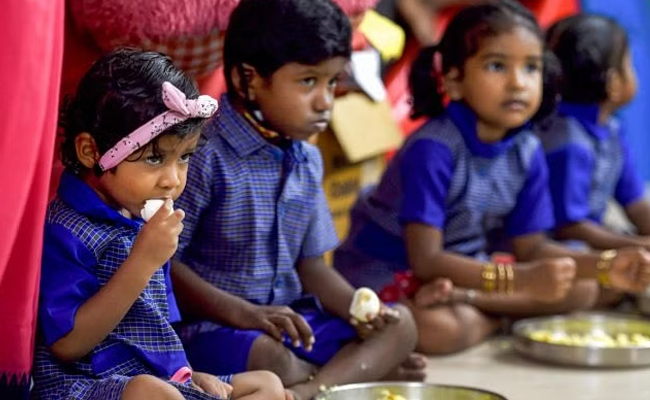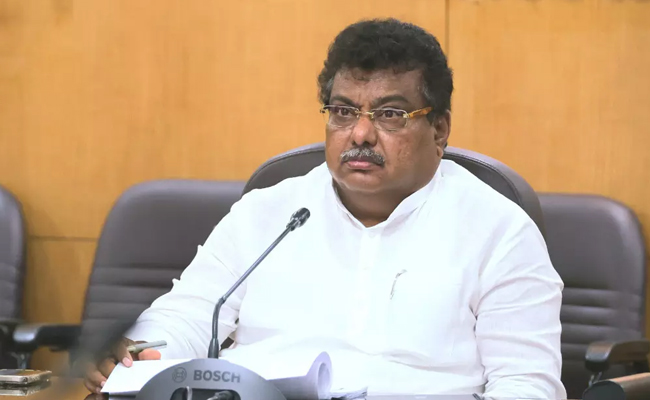Bengaluru (PTI): Students of government schools in Karnataka will now be served eggs six days a week as a part of the midday meal scheme. The move comes after Azim Premji Foundation on Saturday signed a Memorandum of Understanding (MoU) with the Government of Karnataka to support the nutritional enrichment of the state government's mid-day meal programme in government and government-aided schools for three years. Currently, the state government's mid-day meal programme provides eggs on two days of the week to the students.
"The Foundation's support will enable the provision of eggs on all six days of the school week, substantially enhancing the nutrition for students. An alternative high nutrition supplement will be provided for those students who do not consume eggs because of cultural preferences, the foundation said in a statement. Speaking after inaugurated the programme, Karnataka Chief Minister Siddaramaiah lauded the Azim Premji Foundation for its "historic" initiative to provide nutritious meals to school children and stressed that quality food is important for mental health and good education.
According to him, MoU was signed between primary and secondary education department with the Azim Premji Foundation. As per the MoU, the foundation has agreed to supply eggs for four days in a week. One egg to each student -- both to government students and also to government aided schools. Healthy food should be given to all the students whether it is to government schools or aided schools, he said.
ALSO READ: 12 hours on, efforts underway to douse fire on cargo ship off Karwar coast
"I have seen children coming to school without breakfast and staying until noon without lunch. This prompted us to provide food and eggs twice a week. Now, the Azim Premji Foundation has joined hands with the government to provide eggs and nutritious food to children for four additional days a week," he said. He also stressed on the importance of scientific and intellectual development of students, encouraging them to become socially responsible individuals.
"Our goal is to create opportunities for quality education for poor children. For this reason, apart from providing uniforms, shoes, and socks, and we are opening more residential schools," he added.
According to the foundation, eggs will be added to the mid-day meal for the 55 lakh students in these schools -- from Grade 1 to 10 -- to provide this nutritional enrichment. As is well-known, eggs are packed with a wide range of essential nutritional content from proteins to minerals. This initiative will help improve the nutritional status of school students and contribute to their physical and cognitive development.
"The Foundation works extensively across the country to help improve the quality and equity of the public (government) education system. The Foundation will work closely with the Commissioner of School Education and Literacy (CSE) to implement mechanisms to ensure high-quality eggs are delivered to each child in the schools covered by the program," the statement added.
Let the Truth be known. If you read VB and like VB, please be a VB Supporter and Help us deliver the Truth to one and all.
Bengaluru (PTI): Karnataka Minister M B Patil on Tuesday chaired meetings with industry representatives from the aerospace and defence, machine tools, auto/EV, and green energy sectors to discuss sector growth and government support measures.
The meetings were attended by leading industrialists and their representatives, with some participating virtually.
Speaking on the occasion, the minister for Large and Medium Industries said Karnataka is at the forefront of the country’s aerospace and defence sectors.
He noted that Suzuki and Toyota plan to launch aerial taxi services in Japan by 2028, with Bengaluru-based Sasmos supplying electrical equipment for the project.
Industrialists suggested introducing similar “fly-taxi” services in Karnataka through an appropriate policy, which Patil said would be examined seriously.
The minister highlighted the need to establish testing centres and Common Facility Centres for the aerospace and defence industries and assured that these facilities would be provided.
Suggestions were also made to prepare a comprehensive roadmap for sector growth.
Karnataka has urged the Central Government to approve Defence Corridor projects in the Bengaluru North–Kolar–Chikkaballapur and Dharawada–Vijayapura–Belagavi regions.
Industrialists also suggested a corridor between Bengaluru and Mysuru, Patil said.
He said Karnataka aims to become a hub for defence electronics manufacturing, with plans to establish a 200-acre Defence Electronics Park and a 100-acre Avionics and Sensor Park.
These projects will be implemented once the Special Investment Region is operational, and land availability will not be an issue.
On the machine tools sector, Patil said the industry has recorded an annual turnover of Rs 36,500 crore and is witnessing steady growth.
Large-scale exhibitions have increased demand, and the state must strengthen its capabilities to develop control systems for heavy machinery. One testing unit is already operational in Bengaluru, with another planned for Tumakuru. Expansion of vocational training institutes in industrial areas is also underway.
In the Auto and EV sector, Vision Group members highlighted the need for a network of dry ports and more EV charging stations across the state.
Patil noted that the Tata Group is manufacturing EV buses in Dharawada for nationwide supply. Plans for mini excavator production and export facilitation were also discussed, along with the establishment of a testing facility for two-wheeler EVs.
For the Green Energy sector, the group emphasised the need for a suitable policy on battery-based energy storage and the establishment of data centres.
Patil assured that the government will seriously consider all suggestions and respond positively.





_vb_21.jpeg)